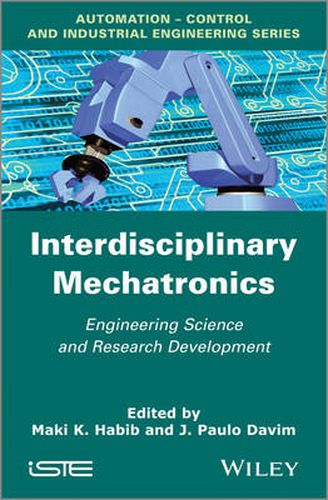Readings Newsletter
Become a Readings Member to make your shopping experience even easier.
Sign in or sign up for free!
You’re not far away from qualifying for FREE standard shipping within Australia
You’ve qualified for FREE standard shipping within Australia
The cart is loading…






Mechatronics represents a unifying interdisciplinary and intelligent engineering science paradigm that features an interdisciplinary knowledge area and interactions in terms of the ways of work and thinking, practical experiences, and theoretical knowledge. Mechatronics successfully fuses (but is not limited to) mechanics, electrical, electronics, informatics and intelligent systems, intelligent control systems and advanced modeling, intelligent and autonomous robotic systems, optics, smart materials, actuators and biomedical and biomechanics, energy and sustainable development, systems engineering, artificial intelligence, intelligent computer control, computational intelligence, precision engineering and virtual modeling into a unified framework that enhances the design of products and manufacturing processes.
Interdisciplinary Mechatronics concerns mastering a multitude of disciplines, technologies, and their interaction, whereas the science of mechatronics concerns the invention and development of new theories, models, concepts and tools in response to new needs evolving from interacting scientific disciplines. The book includes two sections, the first section includes chapters introducing research advances in mechatronics engineering, and the second section includes chapters that reflects the teaching approaches (theoretical, projects, and laboratories) and curriculum development for under- and postgraduate studies. Mechatronics engineering education focuses on producing engineers who can work in a high-technology environment, emphasize real-world hands-on experience, and engage in challenging problems and complex tasks with initiative, innovation and enthusiasm.
Contents:
About the Authors
Maki K. Habib is Professor of Robotics and Mechatronics in the School of Science and Engineering, at the American University in Cairo, Egypt. He has been regional editor (Africa/Middle East,) for the International Journal of Mechatronics and Manufacturing Systems (IJMMS) since 2010. He is the recipient of academic awards and has published many articles and books.
J. Paulo Davim is Aggregate Professor in the Department of Mechanical Engineering at the University of Aveiro, Portugal and is Head of MACTRIB (Machining and Tribology Research Group). His main research interests include manufacturing, materials and mechanical engineering.
$9.00 standard shipping within Australia
FREE standard shipping within Australia for orders over $100.00
Express & International shipping calculated at checkout
Mechatronics represents a unifying interdisciplinary and intelligent engineering science paradigm that features an interdisciplinary knowledge area and interactions in terms of the ways of work and thinking, practical experiences, and theoretical knowledge. Mechatronics successfully fuses (but is not limited to) mechanics, electrical, electronics, informatics and intelligent systems, intelligent control systems and advanced modeling, intelligent and autonomous robotic systems, optics, smart materials, actuators and biomedical and biomechanics, energy and sustainable development, systems engineering, artificial intelligence, intelligent computer control, computational intelligence, precision engineering and virtual modeling into a unified framework that enhances the design of products and manufacturing processes.
Interdisciplinary Mechatronics concerns mastering a multitude of disciplines, technologies, and their interaction, whereas the science of mechatronics concerns the invention and development of new theories, models, concepts and tools in response to new needs evolving from interacting scientific disciplines. The book includes two sections, the first section includes chapters introducing research advances in mechatronics engineering, and the second section includes chapters that reflects the teaching approaches (theoretical, projects, and laboratories) and curriculum development for under- and postgraduate studies. Mechatronics engineering education focuses on producing engineers who can work in a high-technology environment, emphasize real-world hands-on experience, and engage in challenging problems and complex tasks with initiative, innovation and enthusiasm.
Contents:
About the Authors
Maki K. Habib is Professor of Robotics and Mechatronics in the School of Science and Engineering, at the American University in Cairo, Egypt. He has been regional editor (Africa/Middle East,) for the International Journal of Mechatronics and Manufacturing Systems (IJMMS) since 2010. He is the recipient of academic awards and has published many articles and books.
J. Paulo Davim is Aggregate Professor in the Department of Mechanical Engineering at the University of Aveiro, Portugal and is Head of MACTRIB (Machining and Tribology Research Group). His main research interests include manufacturing, materials and mechanical engineering.